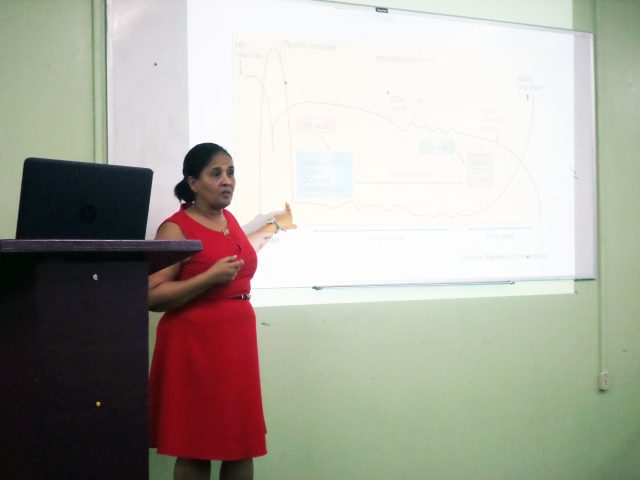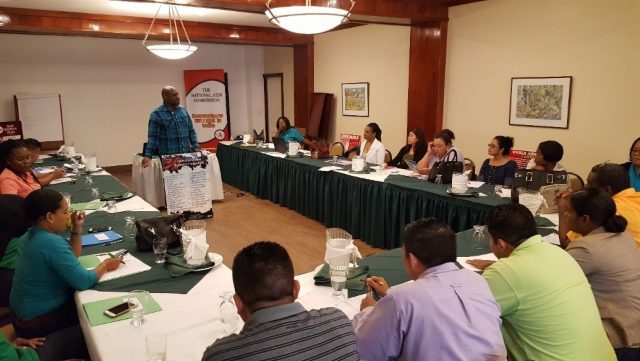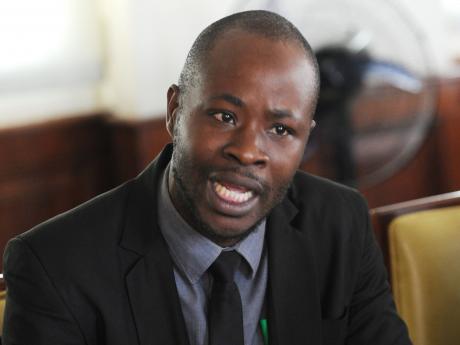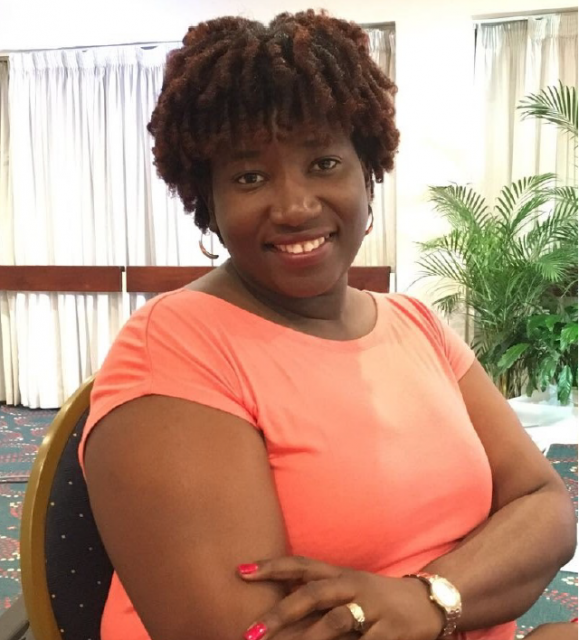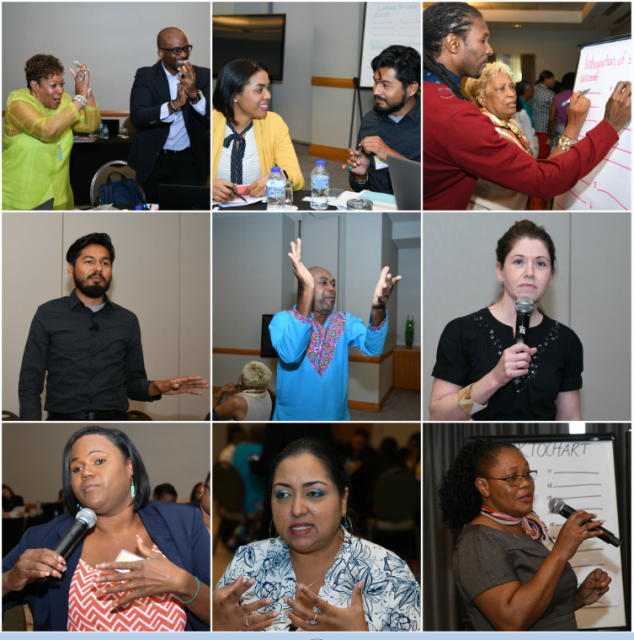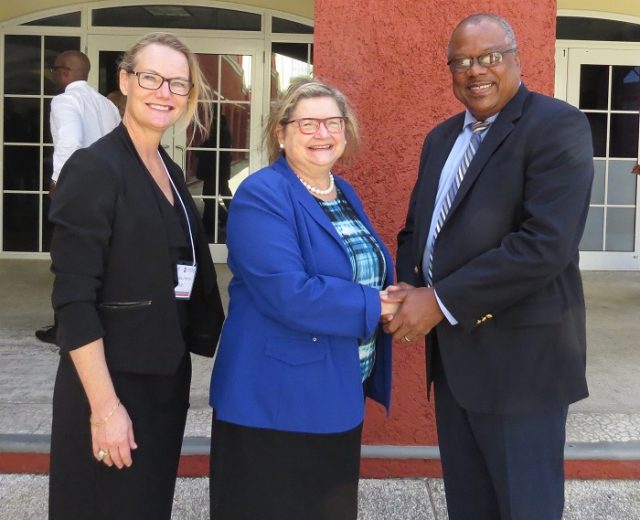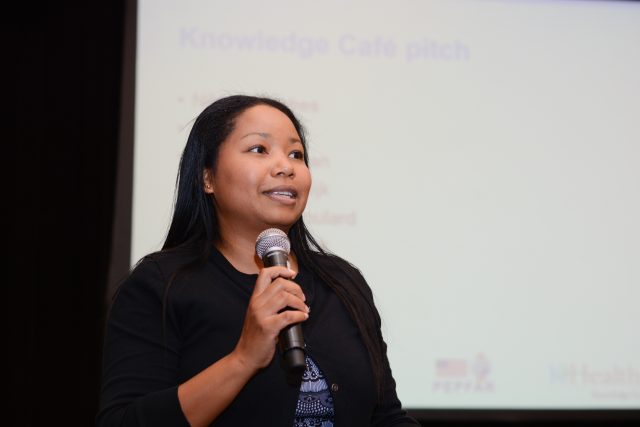Friday, 16 March 2018 (PANCAP Coordinating Unit, CARICOM Secretariat): The Pan-Caribbean Partnership against HIV and AIDS (PANCAP), the mechanism that provides a structured and unified approach to the Caribbean’s response to the HIV epidemic, concluded the Sixth Meeting of National AIDS Programme (NAP) Managers and Key Partners in the Republic of Trinidad and Tobago on Wednesday, 14 March 2018. The meeting came two years ahead of the 2020 deadline for reaching the 90-90-90 targets—90% of people living with HIV diagnosed, 90% of diagnosed people on treatment and 90% of those on treatment virally suppressed.
The forum opened on Monday, 12 March with a Feature Address by the Honourable Terrence Deyalsingh, Minister of Health, Republic of Trinidad and Tobago. Minister Deyalsingh noted that in light of reduced technical and financial support from international partners, the region must collectively mobilize domestic resources especially for the support of prevention and the elimination of HIV-related stigma and discrimination among key and vulnerable populations.
These sentiments were echoed by the participants including National AIDS Programme (NAP) Managers, Chief Medical Officers, Permanent Secretaries, development, and implementing partners, including civil society organizations that work with people living with HIV and key population groups and youth.
In closing remarks, Dr. Nikkiah Forbes, Director, National HIV/AIDS and Infectious Diseases Programme at the Bahamas Ministry of Health, proposed integration of HIV care into other healthcare services in order to assure sustainability of the HIV response. She highlighted that participants recognized integration as one potential solution for improving the accessibility of health services and suggested that it could help countries meet the demand for increased HIV-related treatment, care and support services in the context of scaling up to “Treat All”. (“Treat All” involves offering treatment to all people diagnosed with HIV regardless of CD4 count.)
“Caribbean countries are diverse and integration will need to be tailored for each country context,” stated Dr Forbes, “HIV should never have been completely separated from the health agenda and synergies need to be fostered with sexual reproductive health services”.
She further stated that integration requires healthcare worker training on “Treat All” as well as the meaningful and sustained involvement of Civil Society Organizations (CSOs). For example, there should be leadership and inclusion of People Living with HIV (PLHIV) and key populations on the prevention, treatment and care needs of their communities. Dr. Forbes noted that there should be a focus on quality of care, with steps taken to ensure that members of key populations can access sexual and reproductive health services including HIV and AIDS prevention.
She posited that to achieve integration the region should conduct south-to-south collaborations and draw on regional expertise for training healthcare workers on the front-line response.
Dr Forbes emphasized the integral role of civil society organizations, “CSOs we have not forgotten you”, she stated. “You must be placed and supported in the planning and implementation process which only strengthens the argument for the need for social contracting and crystalizing this in policy. This is how we will sustain the regional response”.
She concluded with an urgent plea for heightened government involvement in funding the HIV response. She advocated that governments need to own the HIV response and in owning it, they need to make the investments needed to reach the prevention, testing and treatment targets that will set the region on course to end AIDS by 2030.
“I make a respectful but urgent plea to our governments to commit to, as well as finance, their National and Regional AIDS response”, stated Dr Forbes. “Without an urgent strategy to sustain the response, we risk leaving many vulnerable groups behind and undoing the gains we have made in reducing HIV transmission”.
– ENDS –
What is PANCAP?
PANCAP is a Caribbean regional partnership of governments, regional civil society organisations, regional institutions and organisations, bilateral and multilateral agencies and contributing donor partners which was established on 14 February 2001. PANCAP provides a structured and unified approach to the Caribbean’s response to the HIV epidemic, coordinates the response through the Caribbean Regional Strategic Framework on HIV and AIDS to maximise efficient use of resources and increase impact, mobilises resources and build capacity of partners.
What are the Joint United Nations Programme on HIV and AIDS (UNAIDS) 90-90-90 Targets?
• By 2020, 90% of all people living with HIV will know their HIV status.
• By 2020, 90% of all people with diagnosed HIV infection will receive sustained antiretroviral therapy.
• By 2020, 90% of all people receiving antiretroviral therapy will have viral suppression.
Background to the National AIDS Programme Managers and Key Partners Meeting
The Caribbean Regional Strategic Framework (CRSF) 2014-2018 articulates the vision and collective priorities of Caribbean states through their membership in the Pan Caribbean Partnership against HIV and AIDS (PANCAP). The core premise is that stemming the HIV epidemic in the Caribbean rests on the commitment, capacity and leadership of national authorities and effective response. The primary goal of regional collaborative efforts is to support country responses by addressing common challenges in the areas of evidence based policy formulation, and innovative responses to addressing legislative gaps, resource mobilisation, coordination and technical assistance., An effective regional response, guided by the CRSF 2014-2018, therefore requires that the links and interfaces between country programmes and regional support programmes be defined and agreed to by country partners. This is critical for strengthening country ownership of the PANCAP response and a shared responsibility to strategically align efforts to end HIV as a public health problem in the Caribbean.
The NAP (National AIDS Program) Managers and Key Partners Meeting provides an opportunity for joint decision-making in setting programmatic priorities and identifying partner contributions in order to strategically align efforts in the fight against HIV. The Meeting Agenda is intended to allow for in-depth analysis and discussion on the relevant aspects of the UN Post 2015 Agenda, and the overall advancements of the Caribbean Region in implementing new initiatives for HIV. It is within this context that opportunities and challenges for the Region and individual countries to expand the national responses will be discussed. PANCAP acknowledges the need for greater attention to inter- country linkages and greater collaboration with regional partners. This will serve to maximise synergies, and provide a mechanism for making regional public goods available to national programmes to enhance their delivery and impact.
Contact:
Timothy Austin
Communications Specialist
PANCAP Coordinating Unit
CARICOM Secretariat
Turkeyen, Greater Georgetown, Guyana
Email: taustin.consultant@caricom.org
Tel: (592) 222-0001-75, Ext. 3409 | Visit www.PANCAP.org


